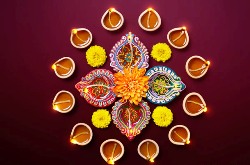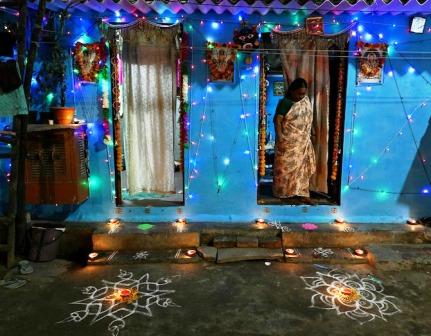13 November 2023: Streets and homes across India were bathed in a warm glow on Sunday night as millions of people celebrated Diwali, the national festival of lights.
The festivities reached new heights in the northern state of Uttar Pradesh, where a record-breaking 2.2 million earthen oil lamps adorned the landscape, setting a Guinness World Record.
However, the exuberance of Diwali was not without its challenges. Despite concerns about air pollution and a ban on firecrackers, populations across towns and cities, including the capital, New Delhi, defiantly lit sparklers and set off fireworks.
Indian officials had issued warnings over worsening air quality this weekend, with hazardous levels recorded in New Delhi just last week. A brief spell of rain provided temporary relief, but the revelry on Sunday night created a new cloud of smoky haze in the capital, where nearly 33 million people reside.
By midnight local time, major urban areas, including New Delhi and Calcutta in eastern India, experienced a dangerous deterioration in air quality. This period typically marks the beginning of the “pollution season” in New Delhi, lasting several months and fueled by factors such as vehicle exhaust, construction dust, industrial emissions, and crop burning in nearby states.
Despite the concerns, firecracker bans are often overlooked during Diwali celebrations due to the festival’s deep cultural significance. The Supreme Court of India refrained from imposing a blanket ban on all firecrackers this year, instead reminding states to prohibit the sale of firecrackers containing banned chemicals.
Symbolizing the triumph of light over darkness, Diwali is an annual festival celebrated not only by Hindus but also by Sikhs and Jains in western India, as well as across the South Asian diaspora. Sri Lanka and Nepal also partake in the festivities, along with Indian and Hindu populations in Singapore, Fiji, and Malaysia.
During the five days of Diwali, celebrants engage in feasting, share sweets, worship, and spend time with loved ones. The lighting of candles, setting off fireworks, and adorning homes, temples, and riverbanks with earthenware oil lamps, known as diyas, are key traditions. “Deepavali,” meaning “a row of lights,” captures the essence of this vibrant celebration.
In Uttar Pradesh, devotees achieved a remarkable feat on Saturday by lighting over 2.2 million oil lamps in Ayodhya, on the banks of the Saryu River, the birthplace of the Hindu god Ram. This achievement secured a place in the Guinness World Records, with representatives presenting a record certificate to Chief Minister Yogi Adityanath.
While the festival brings joy and unity, the challenge of balancing tradition with environmental concerns remains, as Diwali’s luminosity is accompanied by a cloud of concern over air quality in many parts of the country.
BY NEWSNET INTERN SIMON MARBANIANG BASED ON AVAILABLE INFORMATION



